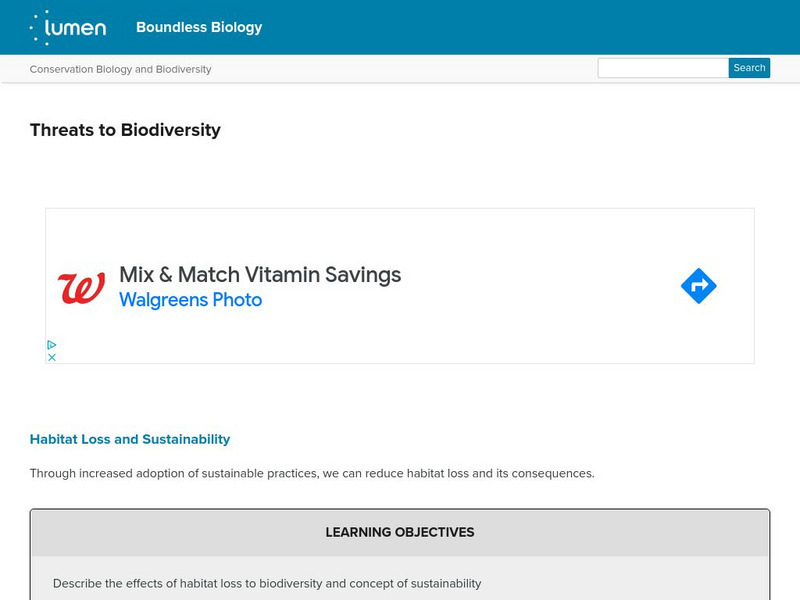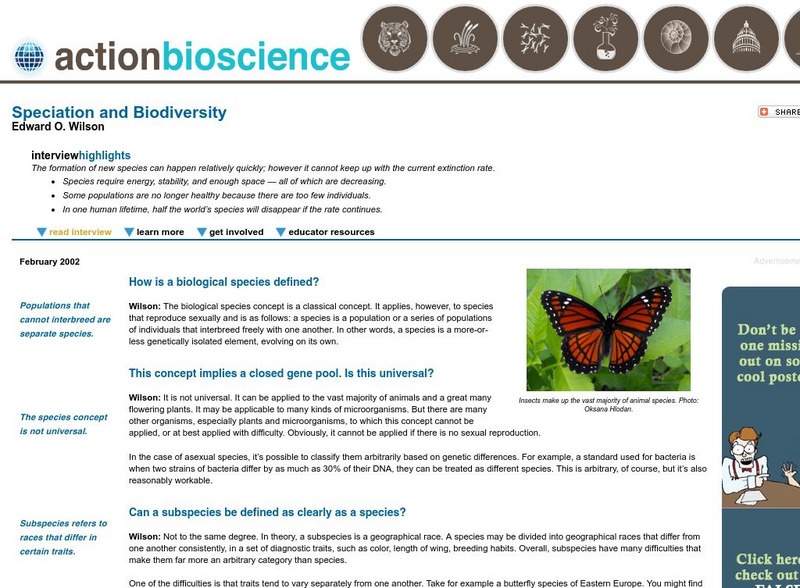Hi, what do you want to do?
Curated OER
What's That? Diversity Among Organisms
Seventh graders can go outside and explore the organisms that live in the environment outside their door. This is a wonderful opportunity for students to examine the world around them with a new perspective. This activity will increase...
Curated OER
pH Readings and Salinity Readings of Water From Three Locations Within the Neponset River Watershed
Sixth graders test the ph levels of water from three different water environments within the Neponset River Watershed. They discuss the three different water environments, take pH measurements of the three samples, and predict which...
Curated OER
Community Action
Fifth graders brainstorm a list of decisions that students make daily that affect the welfare of the environment categorizing them as being either helpful or harmful. They then trace local actions to distant consequences to determine how...
Curated OER
One Square Meter
Students examine various ecosystems using scientific inquiry. Using the local area, they assess the characteristics and conditions in one square meter. They report their findings in the form of a survey map and data sheet. They...
Curated OER
Natural Puerto Rico
Students explore the nature of Puerto Rico. They view a Power Point presentation on world population and discuss how Puerto Rico landscape differs from Wisconsin's landscape. They create a Venn diagram comparing the two and complete a...
Curated OER
The Trail of a Snack Food
Students identify some of their favorite snack foods. Using this information, they discover the resources needed to produce the food. In groups, they research different alternatives to make their favorite food in order to protect the...
Curated OER
Evolution: Adaptation
Tenth graders practice new skills and apply them. The skills of research should motivate them to want more knowledge. The concept of adaptation is used as a context for the lesson plan of practicing research skills.
Curated OER
Most Troublesome Exotic Invasive Plant Species Web Quest
Young scholars participate in a Web Quest activity in which they identify common exotic invasive plant species of the Southern Appalachian Region. After identifying the top 10 exotic invasive species, they choose one to research in depth.
Curated OER
Coral Reefs Endangered
Students research where in the world coral reefs are located. In this ecology lesson plan, students create food chains and food web. They simulate growing coral reefs to understand their characteristics better.
Curated OER
Exploring Climate Change with GIS
Students investigate climatological changes that are occurring to the Earth. In this climate change lesson plan, students access an assigned web site to view maps and lessons that show how climate change makes a difference to life on Earth.
Curated OER
Exploring Fish Anatomy and Commercial Fishing Gear
Students investigate commercial fishing by exploring the technical methods. In this environmental activity, students identify the fish that are most commonly consumed by humans and trace their path from ocean to plate. ...
Curated OER
Pheed the World: Edible Phyla
Students discuss the contributions of different organisms to our world. In this biology lesson, students research countries with limited food supply. They create an improvement plan for a fictitious country assigned to them.
Curated OER
Who's the Baddest?
Students are introduced to the realm of social insects, their role in the environment and the biological features that make them unique.
Curated OER
Mountains in the Sea Exploration No Escape
Students study data to hypothesis about the influence of a water circulation cell on the retention of benthic invertebrate larvae in the area of a seamount. They investigate the positives and negatives of larvae retention in this series...
Curated OER
Natural Inquirer
Students interview wildlife experts to gain information needed to research and write a report about an aquatic plant or animal affected by climate change.
Curated OER
Charles Darwin's Hardware Shop
Students construct an evolutionary tree representing specialization, diversity, and selection using easily obtained materials. They use at least twenty pieces of hardware to classify then develop "evolutionary" relationships between the...
Curated OER
Communication in Bees
Eighth graders identify and interpret a scientific investigation and a hypothesis through experimentation and testing a hypothesis. They identify what scientists hypothesized about the communication of stingless bees. Finally, 8th...
Annenberg Foundation
Annenberg Learner: The Habitable Planet: Unit 9: Biodiversity Decline
This is an extensive learning module on biodiversity and its decline. It looks at ways biodiversity is threatened, the possibility of another mass extinction, the causes and consequences of habitat loss, factors that drive biodiversity...
Natural History Museum
Natural History Museum (Uk): Biodiversity
Find a wealth of scientific information on the status of biodiversity in the world today, the threats it faces, and why it is critically important to preserve it.
Lumen Learning
Lumen: Boundless Biology: Threats to Biodiversity
Looks at the impact of overharvesting, such as overfishing, on biodiversity. It talks of the 'tragedy of the commons,' where harvesters do not feel responsible for protecting a species because they fish in shared areas. It also touches...
American Institute of Biological Sciences
Action Bioscience: Speciation and Biodiversity
Dr. E.O. Wilson, known internationally as the dean of biodiversity, answers several probing questions about speciation and biodiversity.
NOAA
Noaa: Estuaries 101 Curriculum: Biodiversity in an Estuary
This activity introduces students to the amazing biodiversity of an estuarine environment, focusing on the habitats in the Rookery Bay National EstuarineResearch Reserve, Florida. They begin by exploring the estuary using Google Maps....
PBS
Pbs Learning Media: Building a Biodiversity Timeline
Students learn how various kinds of data and information can be gathered to create a biodiversity timeline that serves as evidence of changes in a population of a species.
American Institute of Biological Sciences
Action Bioscience: Agroforestry and the Maintenance of Biodiversity
Aligned with National Science Education Standards, this article details the goals and processes of agroforestry. Agroforestry is a system of growing trees among areas populated by crops or livestock in an effort to maintain and encourage...
Other popular searches
- Biodiversity and Ecosystems
- Biodiversity in Forests
- Biodiversity Loss
- Insect Biodiversity
- Great Lakes Biodiversity
- Marine Biodiversity
- Biodiversity of Fish
- Climate and Biodiversity
- Global Biodiversity
- Hall of Biodiversity
- Biodiversity in Utah
- Biodiversity Bingo



























